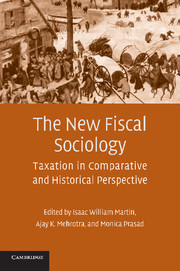Book contents
- Frontmatter
- Contents
- List of Contributors
- Acknowledgments
- Foreword
- 1 The Thunder of History: The Origins and Development of the New Fiscal Sociology
- PART ONE SOCIAL SOURCES OF TAXATION: AMERICAN TAX POLICY IN COMPARATIVE PERSPECTIVE
- PART TWO TAXPAYER CONSENT
- PART THREE THE SOCIAL CONSEQUENCES OF TAXATION
- 10 Extraction and Democracy
- 11 Improving Tax Administration in Contemporary African States: Lessons from History
- 12 Adam Smith and the Search for an Ideal Tax System
- 13 Where's the Sex in Fiscal Sociology?: Taxation and Gender in Comparative Perspective
- 14 The Shoup Mission to Japan: Two Political Economies Intersect
- Epilogue: A Renaissance for Fiscal Sociology?
- References
- Index
13 - Where's the Sex in Fiscal Sociology?: Taxation and Gender in Comparative Perspective
Published online by Cambridge University Press: 13 January 2010
- Frontmatter
- Contents
- List of Contributors
- Acknowledgments
- Foreword
- 1 The Thunder of History: The Origins and Development of the New Fiscal Sociology
- PART ONE SOCIAL SOURCES OF TAXATION: AMERICAN TAX POLICY IN COMPARATIVE PERSPECTIVE
- PART TWO TAXPAYER CONSENT
- PART THREE THE SOCIAL CONSEQUENCES OF TAXATION
- 10 Extraction and Democracy
- 11 Improving Tax Administration in Contemporary African States: Lessons from History
- 12 Adam Smith and the Search for an Ideal Tax System
- 13 Where's the Sex in Fiscal Sociology?: Taxation and Gender in Comparative Perspective
- 14 The Shoup Mission to Japan: Two Political Economies Intersect
- Epilogue: A Renaissance for Fiscal Sociology?
- References
- Index
Summary
INTRODUCTION: BEYOND WAR
In a book on a subject as daunting as fiscal sociology, getting the word sex into the title of a chapter makes obvious marketing sense. Yet, in fact, something important is missing from the other chapters, each valuable and interesting in its own right.
The field of fiscal sociology, born in Schumpeter's stirring invocation of the “thunder of history” (Schumpeter [1918] 1991), has dwelt, as many of the other chapters show, mainly with how government tax (or “extraction,” in Charles Tilly's preferred word choice in Chapter 10) schemes interact with large-scale issues of war, crisis, state construction and destruction, and the like. These are important subjects, situated at the macro level of society. A closer and more detailed look at tax systems show that they have deep, persistent consequences on the micro level as well. Fiscal policies affect patterns of marriage, childbearing, work, savings, education, charity, home ownership, and more. Fiscal sociology is thus an essential element of cultural sociology. Social norms and biases are reflected in fiscal – tax and transfer – systems, and such systems, in turn, exercise coercive force, tending to entrench patterns of social life in an endless feedback loop, a point also emphasized in Beverly Moran's chapter. This is rich and important subject matter for multidisciplinary scholars to explore.
The taxation of households illustrates the point. Tax codes and other aspects of fiscal systems have often been explicitly sexist (Stotsky 1996; Teck 2004).
- Type
- Chapter
- Information
- The New Fiscal SociologyTaxation in Comparative and Historical Perspective, pp. 216 - 236Publisher: Cambridge University PressPrint publication year: 2009
- 11
- Cited by



